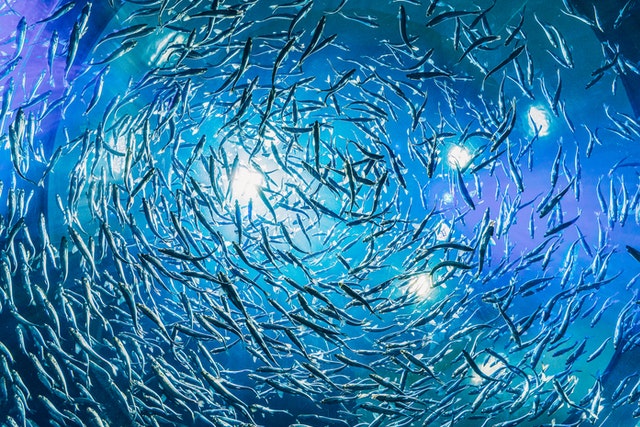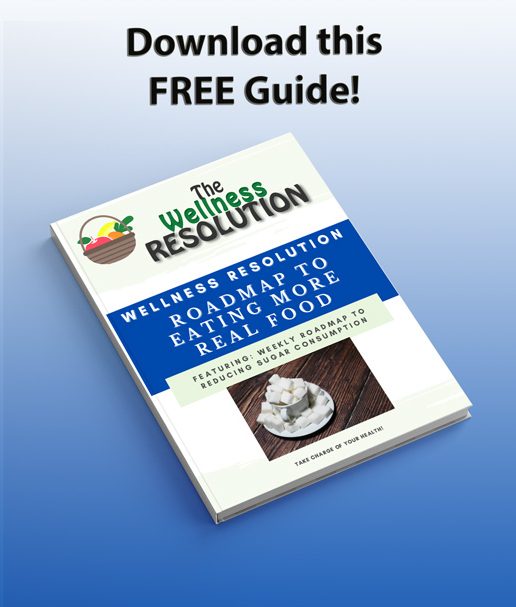Wild-caught vs farm-raised fish, which one is healthier for you? Typically wild-caught fish, but there are some exceptions to this rule, which I will go over. I’ve got all the fishy facts you need to know! I will discuss the dangers of farm-raised fish, why it is worth the possible added expense to purchase wild-caught fish, how fish can be a superfood due to the Omega 3s it provides us, and concerns of overfishing.
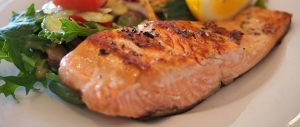 What is Wild-Caught Fish?
What is Wild-Caught Fish?
Wild-caught fish is when fish are caught while in their natural environment by fishermen. They eat fish and other organisms found in their natural habitat (lakes, rivers, oceans).
What is Farm-Raised Fish?
Farm-raised fish is also referred to as aquaculture. Farm-raised fish typically live in tight cages. They usually eat processed pellets of small fish that are found close to shore where there is more pollution. But in some fish farms, they are fed corn, soy, and other grains. As I mentioned in previous blogs, corn and soy are typically genetically modified, which makes them very unhealthy to consume. A diet that is also very unnatural for fish.
You should also know: At least 35 species of fish are currently being genetically engineered around the world, including trout, catfish, tilapia, striped bass, flounder, and many species of salmon (Center for Food Safety).
Other Dangers of Farm-Raised Fish
Pollutants
Some of these pollutants include mercury, a metal that is super harmful to your body and is not easy to get rid of. The reason I know this is because my body was found to have high levels of mercury in it, and over two years and trying two different detox methods, I still had heavy doses of mercury in my body. Strangely, I have had no high exposures to mercury in the workplace or any other aspect of my life. Even the healthiest eaters actually have been found to have traces of metals in their bodies. Metals can cause all sorts of problems in the body (I will dive deeper into this in a later blog). But yes, we all have a built-up of metals in us. Cool right? Not really!
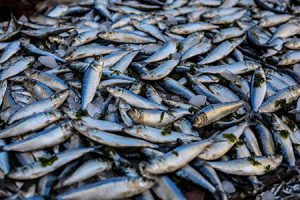 PCB’s – Banned But Still in Farm-Raised Fish
PCB’s – Banned But Still in Farm-Raised Fish
Other pollutants include PCB’s that raise cancer risk. NOTE: PCB’s (used in electric and cooling fluid) were actually banned by the U.S. in 1979. Yet, PCB’s are still being found in fish because often farmed fish are fed wild fish from areas high in PCBs. Seven out of ten pieces of farmed fish tested had concentrations of cancer-causing PCBs high enough to trigger health warnings from the U.S. Environmental Protection Agency (Herring). For salmon eaters, there are 10x more cancer-causing toxins in farm-raised fish than wild-caught fish. There are a couple of other toxins found in salmon that are linked to Parkinson’s Disease and reproductive and nervous system damage.
Farm-raised salmon has forty times more PCBs than any other food on the market.
Fish Get Yummy Antibiotics TOO & Illegal Veterinary Drugs!
Due to the limited space, the likelihood of developing diseases increases. Therefore, they receive antibiotics just like cows – apparently even more than any other livestock (view: Eating Healthier Meats blog). This contributes to an increase in antibiotic-resistant bacteria in our bodies. Which isn’t great when we need antibiotics for a serious health issue. Oh, and along with the antibiotics, they will give them some harsh chemicals to kill disease that is even added to the water and disperses throughout oceans and rivers. This is definitely bad for the environment. I think we can agree on that.
If you look at where your fish is coming from you will also see that it isn’t always U.S. farm-raised fish. It often comes from China, which is even worse than fish farming in the USA. China is one of the largest exports of seafood in the world. They also have the most toxic, contaminated waters. My husband who has been to China tells me about how dirty and polluted China is, and I have no interest in ever visiting after hearing his stories. According to an actual fish farmer, due to toxic water, they feed their fish illegal veterinary drugs, along with antibiotics and pesticides.
We import around 90% of the fish we eat from other areas of the world.
Is Any Farm-Raised Fish Decent Quality?
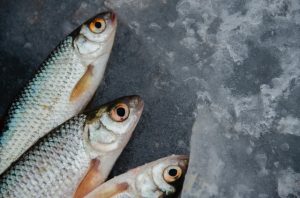
There are some farmed fish that can actually be of decent quality. There are some farmers who are picky about what the fish eat, the use of antibiotics, or hormones, and work to utilize clean water sources. When farmed fish are raised correctly, fed premium quality fish food, and responsibly farmed, they could be even healthier than eating wild-caught fish. Wild-caught fish isn’t 100% guaranteed to be better quality because fishermen could fish from polluted waters that contain metals or other chemical pollutants.
There are also exceptions, based on what type of fish you are looking to consume. For some fish, you might actually want it farm-raised, as long as it is done responsibly.
To find quality farm-raised fish you need to look for one of these four labels: Aquaculture Stewardship Council, Naturland Certification, BAP Certified, or Canada Organic.
ACMETOP Portable BBQ Grill Basket is a necessity when grilling. You don’t want to use foil due to the toxins they can emit. This always makes a delicious salmon filet.
Is Eating Fish Even Worth It? Actually Yes!

Fish is super beneficial for Omega 3’s, which our bodies need.
Wild Caught Fish Such as Salmon is a Super Food!
A benefit of eating wild-caught fish is you are also going to eat more Omega 3 fatty acids, which your body needs! They help with heart health, fight inflammation (the leading cause of most modern illnesses), improve mental health like brain fog, skin health, and more! View more science-backed benefits.
Omega’s 3s your body doesn’t produce on its own, you have to consume foods with high Omega 3s. But, the omega 3 fats in farm-fresh fish can create inflammation. Unfortunately, there are not many choices of foods to consume for enough Omega 3s. No other food contains as much Omega 3s as fish. Fish or fish supplements are necessary to get enough of them into your diet. ONLY 2% of the population consumes enough omega 3s from their diet alone. (I will discuss this a bit more in a future blog on supplements).
Quick Story: My husband actually had some brain fog, and I didn’t know it was due to low Omega 3s. However, I knew from every practitioner I have worked with that it is essential for your health. It is one of the top recommendations of every natural practitioner I’ve talked to. We had him tested, and sure enough, his Omega 3s were extremely low. He started taking Omega 3 supplements and within a week he noticed a difference with better mental clarity. Even with us consuming fish once a week, his levels were still very low.
Sabatier, Black Flex Turner
This is the best spatula I own. It’s not just useful for grilling or baking fish but for scraping cookies off a cookie sheet, flipping or removing eggs from a pan, and more! My husband and I use it more than any other spatula, and have recently bought another.”
Wild-caught fish also means more protein and healthy fats. When you do consume wild-caught fish it is one of the healthiest proteins you can consume along with eating chicken. This is because red meats like beef, lamb, and pork are less lean with more saturated fat, raising blood cholesterol. Eating lean meat is better for you. About 2 to 3 ounces is considered a good serving size.
How to Tell Wild Caught Fish From Farmed?
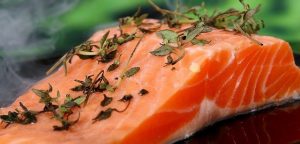
Wild-caught Salmon is the easiest to see the difference. Wild fish is a darker red color and doesn’t have those white lines across it, and the fish get more exercise so they are slimmer pieces of meat.
Wild-caught fish is always leaner, but it is hard to see the difference visually if it’s not salmon. You might want to ask the person behind your fish counter, or the manager to find out if they know for a fact certain fish is wild-caught. You can ask where it is caught, and what the fishing operation is like.
Unfortunately, many fish products are often mislabeled. Fish that is supposed to be wild-caught has been labeled as farm-raised. In 2015, the conservation group Oceana had researchers collect 82 samples of salmon labeled “wild” from restaurants and grocery stores in Chicago, New York, Washington, D.C., and Virginia (Dr. Friedman). Using DNA analysis, they found almost half the salmon, 43 percent, was mislabeled—and 69 percent of that mislabeling was farmed Atlantic salmon being sold as wild (Dr. Friedman).
Marine Stewardship Council is the certification to look for when searching for wild-caught fish!
12in Grill Basket, HaSteeL
Grill baskets can be great for cooking seafood such as shrimp on the grill but also work really great for vegetables, or even nachos with melted cheese – one of our favorites.
Should We Be Concerned About Overfishing?
Wild-caught fish doesn’t come without some cons. However, here in the U.S. the National Oceanic Atmospheric Administration (NOAA), has some rules in place to help protect fish and the marine ecosystem. If you are worried about sustainability, you can always eat less popular fish vs. popular options like Alaskan Salmon. An environmentalist may say there is in fact a problem with regards to overfishing. I’m not well-educated on this topic. I don’t know as much about environmental concerns. If you are concerned, I would recommend doing some research.
In Conclusion,
Try to find out where your fish is coming from, try to find certifications. Also, keep in mind that most of us need fish in food or supplement form to consume enough Omega 3s. If you are looking for Omega 3 supplements, make sure to get high quality, wild-caught/sustainably sourced. Make sure the brand/company is reputable. Also, check with your doctor. Check to make sure it doesn’t interfere with anything else you are taking.
Download this Free Guide:
Roadmap to Eating More Real Food & Reducing Sugar Consumption
View More Healthy Eating Blogs
- 8 Tips on How to Eat Less Packaged Food (Less Junk Food)
- Over 30+ Gluten and Dairy Free Breakfast Ideas (& Sugar-Free)
- Reading and Decoding Food Labels & Toxic Ingredients
- 11 Superfoods for a Diet Higher in Nutrients
- 30 Clean Snacks and Desserts (Gluten-Free, Sugar-Free & Dairy-Free Options)
- How to Choose Healthier Dairy Products & Alternatives to Dairy
- The Truth About Milk – Why We Don’t Need it to Stay Healthy
- Guidelines & Steps to Reduce Sugar Intake
- Wild Caught vs Farm Raised Fish – What is the Difference? Which is Healthier?
- How to Choose Healthier Meats
- What Does Non-GMO Mean? Are GMOs Safe?
- How to Eat Real Foods & Why It Is Essential for Your Health
- When is Organic Really Worth it?
- Organic vs. Natural: What is the difference?
- Is White Flour Bad For You? Should We Be Eating Less Carbs?
- How the Sugar Industry Tricked us for 50 Years
- Sugar Pains? Sugar – One of our Biggest Enemies!
Resources:
- Dr. David Friedman/Dr. Friedman’s Health Blog. Retrieved from: https://www.doctordavidfriedman.com/blog/farmed-and-dangerous
- Herring, Kelley. Healing Gourmet/6 Reasons You Should Avoid Farm-Raised Fish. Retrieved from: https://healinggourmet.com/why-you-should-avoid-farm-raised-fish/
- Lehman M.S., Shereen. (2020, October 14). Retrieved from: https://www.verywellfit.com/wild-caught-vs-farmed-fish-4145790
- Seafood Watch/ What is eco-certified seafood?. Retrieved from: https://www.seafoodwatch.org/seafood-recommendations/eco-certification
- Center for Food Safety/ABOUT GENETICALLY ENGINEERED FISH. Retrieved from: https://www.centerforfoodsafety.org/issues/309/ge-fish/about-ge-fish#:~:text=At%20least%2035%20species%20of,and%20many%20species%20of%20salmon.
I have a Wellness Coach Certificate, I'm an entrepreneur, an innovator, writer, and artist. My expertise includes over 7 years of marketing, research, and developing content for holistic health businesses. Plus, my own personal journey of becoming chronically sick: understanding what went wrong, and finding a way to heal and live a healthier life. I have a passion for wellness with a wealth of knowledge surrounding: wellness, flaws in healthcare, root causes for chronic illnesses, and alternative treatments.

